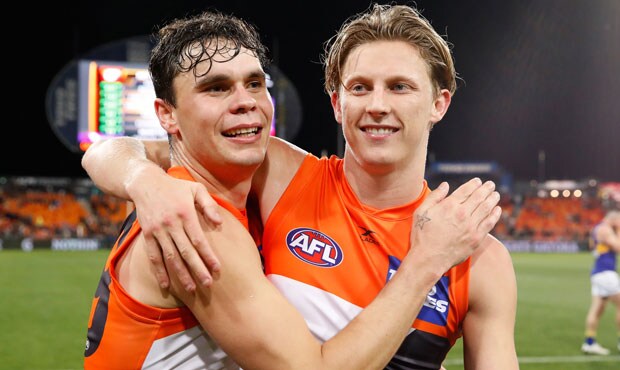Lachie Whitfield wanted to try something new. After five years of running the wings, he felt like it was time to learn something different and become something a bit more. His first thought was that he wanted to spend more time in the midfield, so at the start of last pre-season he started getting himself ready for it. “I was ready for a new challenge and I thought that might be the next progression for me as a footy player, because you can only do so much on the wing,” he said. “I’ve probably always been suited as a winger, but no-one ever grows up thinking they want to play their whole career as a wingman, everyone aspires to be a gun midfielder.
“That was my aim, to get into the midfield, so I was working on my inside craft and talking to Lenny Hayes, spending some more time with the guys in there and thinking that was the way things would probably go. But then everything changed.”
First, Zac Williams injured his Achilles during a training session in January. Then Isaac Cumming hurt his calf. Next, Harry Perryman had a sore back. With about one week to go before the pre-season games started the coaches came to Whitfield to tell him they needed a new half-back. There was no-one else left to do it, they said. It was going to have to be him.
“I was the last one there for them. I was the very last option, and even then I think they liked the idea of my creativity off half-back but weren’t too confident I had the defensive skills to make it work down there how they wanted,” Whitfield said.
“They were good in their message to me, though. They just said, ‘you’ve got good defenders around you, they’ll talk to you and they’ll help you with it and teach you and look after you.’ It was pretty much, ‘we’ll show you what to do and try and get you going, but rely on the players around you, use them and make the rest up as you go along.”
Whitfield was happy with that. One thing about his new role has unsettled him at times this year – finding players to kick in to from the goal square isn’t always easy given how well most teams set up defensively, no matter how well you have always been able to kick the ball – but he has generally been happy to take things as they come, work things out as he goes along and not get too worried about what might go wrong.
He has had lots of help, too, first of all from the player whose place he took. Whitfield and Williams are close, and he still hates thinking back to the day his friend went down with such a serious injury, so close to the season starting. “It was just one of those horrible days. I can remember him crying after he went inside and just feeling shattered for him and for the team because we wouldn’t have him for such a long time,” said Whitfield, who has appreciated his advice before and during games each week.

“We obviously talk all the time, but he grabs me at half time during every game and helps me out with my positioning,” he said. “He gives me confidence because he’ll say, ‘look, you want the ball in your hands, make sure you take the game on and see what’s in front of you and go for it.’ He’s really reassuring and he’s an expert on playing the position so he’s been helping me out a lot with my spacing, and things like that.
“I feel like I’m taking his place and like I’m a dog mate, at times, but someone has to do it. It might as well be me. I just want him back, so that we can play down there together.”
There have been some hiccups, other than the odd stray kick-in. “I tend to track the footy more than my man, so there’s been a few times when I’ve found myself ball watching, then I turn around and my man has 50 metres on me,” Whitfield said.
“There was one time against West Coast where I found myself in the forward pocket, turned around and Jamie Cripps was in the middle of the ground and I thought to myself, ‘oh no, how did this happen?” It’s a pretty big sprint back down there when someone’s that far away.
“That’s been my biggest deficiency so far, but I’m slowly starting to get better at it and the other backs have really helped me with that. They know it’s the biggest problem I’ve got, so as soon as the ball is gone from my area they’re yelling at me and saying ‘look behind you’ and stuff like that. It’s good to know they’re there and they’re sort of helping it all become a bit more natural.”

They’ve also made him feel part of something he never really has, while playing on the wing or at the GIANTS, as much as he loves his club and his teammates. He’s now part of one of those ‘teams within a team’ that he has heard so much about, but never really experienced or appreciated.
“It’s probably the one line that doesn’t have moving parts, the backline. We just have a lot of time together, and we’re pretty basic in the way we go about things. We’ve got a big emphasis on chopping out in the air and helping each other out, then trying to move the footy out in a pretty exciting fashion. So we stick together a fair bit,” Whitfield said.
“I’ve worked out that the wing is kind of a poor man’s position. You get stuck out there. I didn’t realise how lonely it was until I got to the backs and started to think, ‘I’ve been missing out on this sort of team set up; I didn’t know about any of this.’
“On the wing you can kind of worry about yourself, because you don’t have to communicate with anyone else all that much. You just patrol your wing and try to make sure you do a good job defensively, you don’t really have to rely on anyone like you do down back. And you can have days where the ball just doesn’t come to your side, whereas down back you have the whole ground to work with.
“To be honest, I’m loving it. It’s probably the best fun I’ve had playing footy, this year. There’s been some things to learn but some freedom as well, and it’s just a fun position to play. I’d still love to be a starting midfielder one day, but I’m happy to do whatever the coaches want and if it ends up that they keep me down back, it’s a pretty good place. It’s enjoyable. I wouldn’t mind staying there.”



